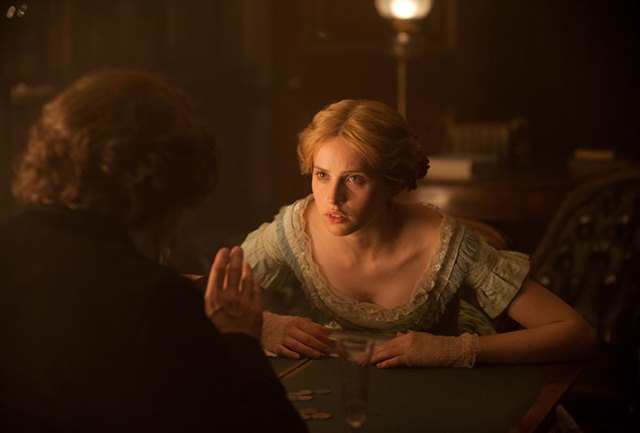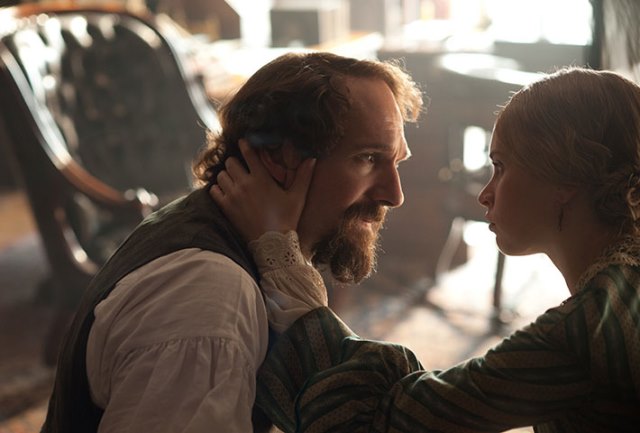CHICAGO – In anticipation of the scariest week of the year, HollywoodChicago.com launches its 2024 Movie Gifts series, which will suggest DVDs and collections for holiday giving.
Mediated Performances Highlight Alternative Story of Charles Dickens’ Personal Life
 Rating: 3.5/5.0 |
After years of enlivening adapted work in front of the camera and on the stage, only recently has the prolific actor Ralph Fiennes taken to directing films; in 2011 he gave the world a version of Shakespeare’s “Coriolanus,” which included the odd treat of watching Gerard Butler espouse the Bard’s words from his mouth, and a sporadically-lauded performance from Vanessa Redgrave.
Not long after the completion of that film, Fiennes has returned with a second directorial bid, “The Invisible Woman,” which finds a focus within the world of another praised artist of the word, but within a much more intimate setting.
“The Invisible Woman” is the story of Charles Dickens’ #2, a fan-turned-mistress named Nelly (played by Felicity Jones from “Like Crazy”). Providing a refreshing perspective to stories set within the social confines of the Victorian period, it is told from the specific recollection of Jones’ “other woman,” making for a tale less one-sided than those out to shame a groupie.

The Invisible Woman
Photo credit: Sony Pictures
Nelly, originally known as Ellen Ternan, comes from a family of touring actors. Her mother (played by Kristin Scott Thomas), sister Maria (Perdita Weeks) and eldest sister Fanny (Amanda Hale) meet Charles Dickens (Ralph Fiennes) when performing “The Frozen Deep,” an adaptation by Dickens of his friend Wilkie Collins’ (Tom Hollander) play. Though Dickens has a wife and ten children, he becomes smitten with Nelly, who already admires the author’s work. With Dickens’ celebrity preceding him, he begins an affair with Nelly, but reaches an extremely difficult crossroads as to how close she can be to him during a very public life.
If it is not too sacrilegious a connection, Jones’ aura is immediately reminiscent of many Liv Ullman performances, especially whenever she played romantic innocent bystanders in Ingmar Bergman films. It’s not just a distinct physical resemblance, of which I’d be lying if I didn’t think they shared two distinct facial features: large, thoughtful eyes, and lips, as contemplative as they are sensual (think Ullman in something like “Scenes from a Marriage,” especially).
It is also in their composure as they play innocent bystanders to tumultuous romance, with Jones channeling the type of control Ullman used when expressing fear mixed with contemplation with a still gaze. In a particularly striking shot in Fiennes’ film, involving Jones being transported in a carriage while facing against the forward motion, she conveys such acutely, which makes her billowing at the end of the entire film more intricately planned. Outside of such comparisons, it’s an impressive performance; one that matures her as a professional actor mentally for me. After seeing her play a tangible young lover in “Like Crazy,” she has now expanded upon such material, but created something even more intricate within relatively the same age. This is one role that shows that Jones will happily be around for a while, with roles that gather more attention (this is one of the more sophisticated performances to be seen from whatever was released in 2013).

The Invisible Woman
Photo credit: Sony Pictures
Playing an author not usually given the scandalous recount, Fiennes shows his trademark strength when toying with the classics, handling Dickens as a regular man who became famous, instead of the other way around. This grounds the emotional conflict within Dickens, of which Fiennes is able to credit to more than just “I get older, they stay the same age” syndrome, which characters in Woody Allen movies, even when played by Max Von Sydow, can be easily lumped into.
While constructed with rich period detail from production designer Maria Djurkovic (“Tinker Tailor Soldier Spy”) and the Oscar-nominated work from costume designer Michael O’Connor, it is the film’s lighting that catches the eye the most. Dimming the film’s overall lightness down with the specific usage of light that shines in through windows or with the usage of candles, “The Invisible Woman” earns a very intimate element with this construction. Such also provides a dark visual tone that translates into the story, where the events might be warm and full of positive hormone satisfaction, but are within a tragic placement. It’s a nice reference to the line from “Great Expectations” that is given pointed significance by an emotionally scarred Nelly in the third act; that of a romance always belonging to the obscurity of shadows.

The Invisible Woman
Photo credit: Sony Pictures
Showing reverence to the material of Dickens without brandishing it as a dialogue hashtag, Fiennes also handles this story with tact (working from a screenplay by Abi Morgan). While dealing with the notion of celebrity, and even the naughty laundry of a revered author, Fiennes maintains the film’s tone as it talks about a rather sensational aspect, keeping in mind first and foremost the emotions within such an event, as to opposed to the elements that could make this a guilty pleasure.
In fact, Fiennes’ film is perhaps most remarkable for its control. Its story does not stimulate Anglophilia as much as one may think, or craft a very complicated portrait of Dickens (RE: my “Dazed and Confused” reference), but it is one of the more authentic and tactful stories to be found in recent about the tale of the “other woman.” Or even, that of the clash of dignity within a celebrity, in which they try to maintain both their public and personal composure (“The Invisible Woman” has strange timing with recent public star meltdowns). Showing to be a sophisticated storyteller who is on the right track to making a great film, Fiennes is not too obedient to the reverence built over time for Dickens. In a striking personal reflection, Fiennes knows when a public artist stops becoming a human being, and simply a subject to the timeless non-art of gossip.
 | By NICK ALLEN |


